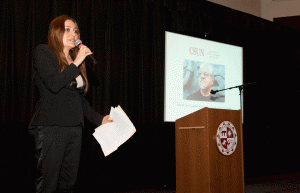CSUN Professors Collaborate on Anthology Exploring Ethnic Studies Education

Denise Sandoval is the lead editor of the anthology “White” Washing American Education: The New Culture Wars in Ethnic Studies, a collaboration of multiple CSUN ethnic studies professors.
The current political climate in the United States has sparked fears of new anti-immigration laws and a potential culture war, prompting scholarly discussions about the necessity of ethnic studies and cultural awareness. A landmark of these discussions is the two-volume anthology “White” Washing American Education: The New Culture Wars in Ethnic Studies — a collaboration from California State University, Northridge ethnic studies professors.
Chicana/o studies professor Denise Sandoval, the lead editor of the book, collaborated with CSUN Asian American studies professor Tracy Buenavista, Africana studies professor Anthony Ratcliff and Los Angeles Unified School District principal James Marín. The team investigated examples of whitewashed U.S. education, to present case studies and to share personal narratives about the struggles of ethnic studies, which had faced many backlashes in the past.
“History has taught us, ‘la lucha continúa’ — ‘the struggle continues,'” Sandoval said. “But the strength we have now is the work of solidarity and collaboration.”
After the state of Arizona passed HB 2281, a law banning ethnic studies in all of Arizona’s educational institutions in 2010, Texas followed with a trend of whitewashing U.S. history in history books. The books downplayed slavery, omitted notable Civil Rights leaders of color or revised information about international relations between the U.S. and other countries.
In response, publishing firm Praeger called for editors willing to work on a book demonstrating the value of ethnic studies in education — and about the impact of diverse ethnicities on U.S. history.
“The history of ‘other’ Americans was considered ‘un-American,’” Sandoval said. “Books were sanitized to remove anything that made the U.S. look bad, including reducing slavery and removing Civil Rights heroes.”
Sandoval and her CSUN colleagues jumped at the chance to include their different disciplines in the anthology. The first volume focuses on K-12, and the second is centered on higher education.
“Part of the motivation for this book was not only documenting what was happening, but also an attest for those of us who were teaching ethnic courses or utilizing ethnic studies pedagogy in our courses,” Sandoval said.
Ethnic studies degrees were established in the late ’60s and early ’70s, with CSUN offering the first Chicana/o studies major nationwide. Sandoval explained that some courses also meet higher education requirements and strengthen social justice awareness and cultural tolerance.
“Right now, living in this crazy, post-election time period, we’re going to need ethnic studies even more,” Sandoval said. “Not just for students from marginalized groups, but also students that might have class, gender or race privilege. These courses give them a new way to think about their world, and to think about discrimination and to see themselves as part of a solution.”
Sandoval earned her master’s degree in Chicana/o studies from CSUN and a Ph.D. in cultural studies from Claremont Graduate University. The cultural diversity and Chicana/o studies department at CSUN drew her back to campus, she said. In particular, Sandoval noted, the students in the cultural identity class she teaches every semester inspire her work — and passion for social justice and the preservation of ethnic studies.
“There are first-generation college students, some of them undocumented, some have survived trauma — but they’re here, in my classroom, a microcosm of CSUN,” she said. “What the [Chicana/o] studies department has created is very strong, and we are such a lucky campus for being so supportive of ethnic studies.”
Sandoval said she has had CSUN students who have wondered why they never learned about certain aspects of U.S. history in high school — and that many undergraduate students of color have learned to connect more with society, after learning how their cultures had contributed to shaping the U.S.
“I try to give them [students] a language in which to see their world, and hopefully inspire them to think about the power they have,” Sandoval said. “Social justice is not just an idea. It’s a pedagogy and philosophy — how we live our lives, recognizing people’s humanity and being willing to fight for equality.”
For more information about the book, visit http://bit.ly/2lIxHW2.

 experience
experience